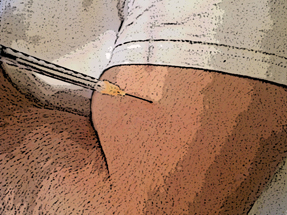 Human Growth Hormone (HGH) has been used by athletes and bodybuilders since the 1970′s, and for good reason. It increases muscle mass, strengthens bone, and promotes the break down of fat (lipolysis). It sounds like the ultimate supplement.
Human Growth Hormone (HGH) has been used by athletes and bodybuilders since the 1970′s, and for good reason. It increases muscle mass, strengthens bone, and promotes the break down of fat (lipolysis). It sounds like the ultimate supplement.
I tried it for 3 months, and during my best month I gained a half-inch on my biceps and lost an inch off my waist. I had plenty of energy to intensely work out six days a week. I simply felt great. However, there are some draw backs.
Disadvantages of Human Growth Hormone
Tevtropin, Omnitrope, Genotropin, and Saizen are all recombinant DNA sources of pituitary growth hormone. They are the best legal supplements for muscle gain or performance-enhancing supplements that you can find. But they have drawbacks.
For instance, finding a doctor willing to prescribe HGH can be challenging in certain areas. The inhibiting factor for me was the cost. Depending on the dose and the brand, a month’s supply can cost from $300 to $1,000 a month.
Ways to Stimulate Human Growth Hormone Release
I knew that growth hormone was made by the pituitary gland and I had read years ago that there were supplements that could induce your pituitary to make more. So over the last year I arduously researched growth hormone releasers to find a way to induce my body to release its own growth hormone. I have tried four prescription items and countless supplements in an attempt to duplicate my success with HGH at a much cheaper price.
Prescription Items: Ghrelin, clonidine, levodopa, and propranolol. 1
Amino Acids: Arginine 2 and ornithine. 3
Non-Pharmacological Methods: Lose weight,4 cut down on starches and sugars,5 get plenty of deep sleep, and exercise on a regular basis.6
Ghrelin worked well, but I was so hungry after taking it I actually fattened up a little. I have taken clonidine and propranolol for blood pressure for a number of years not knowing they actually stimulated the release of growth hormone. If they are HGH releasers, I’ve never noticed it.
It didn’t make sense to me that amino acids would induce HGH release. If so, couldn’t I just eat a piece of meat and get the same effect? However, I tried both arginine and ornithine for five months and I’m not sure I noticed anything. I then looked up a couple of studies that claimed arginine and ornithine induced the release of HGH and I found in those two studies that the subjects were given an injected dose of the amino acids and the release of HGH wasn’t that substantial.
I then turned to the supplement industry. There are a number of growth hormone supplements for bodybuilding that claim to be human growth hormone releasers, stimulators, and inducers.
I have tried eight different brands. They range in price from $20 to $90 and usually contain a cocktail of amino acids and some herbs. I honestly have not noticed any more of a difference taking each of these supplements than I did with arginine and ornithine.
Conclusion
If you have the money and a well-read doctor, injectable HGH is well worth the money. If not, I wouldn’t waste what you have on any product that claims to be a Human Growth Hormone Releaser.
References
- Low L. (1991). “Growth hormone-releasing hormone: clinical studies and therapeutic aspects”. Neuroendocrinology 53 Suppl 1: 37–40.
- Alba-Roth J, Müller O, Schopohl J, von Werder K. (1988). “Arginine stimulates growth hormone secretion by suppressing endogenous somatostatin secretion”. J. Clin. Endocrinol. Metab. 67(6): 1186–9.
- Elam R, Hardin D, Sutton R, Hagen L. (1989). “Effects of arginine and ornithine on strength, lean body mass and urinary hydroxyproline in adult males”. J Sports Med Phys Fitness 29(1): 52-6.
- Williams T, Berelowitz M, Joffe S, et al. (1984). “Impaired growth hormone responses to growth hormone-releasing factor in obesity. A pituitary defect reversed with weight reduction”. N Engl J Med 29; 311(22):1403-7.
- Livesey G, Taylor R, Hulshof T, Howlett J. (2008). “Glycemic response and health—a systematic review and meta-analysis: relations between dietary glycemic properties and health outcomes”. Am J Clin Nut. 87(1): 258S-268S.
- Godfrey R, Madgwick Z, Whyte G. (2003). “The exercise-induced growth hormone response in athletes”. Sports Med. 33(8): 599-613.
